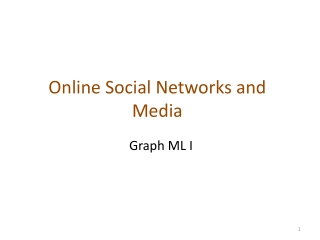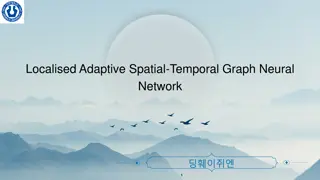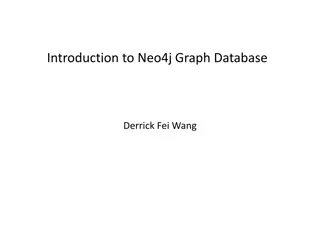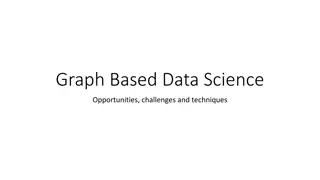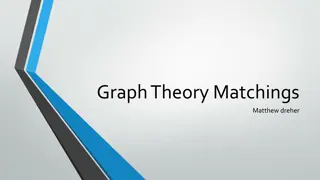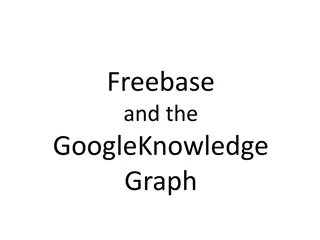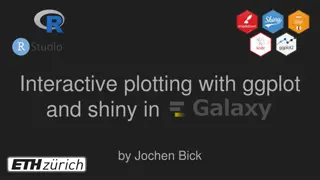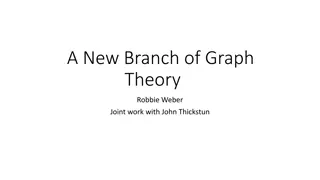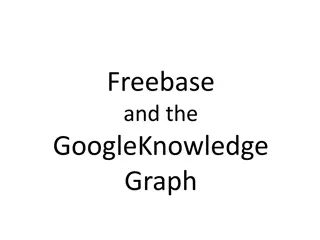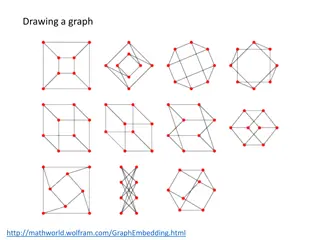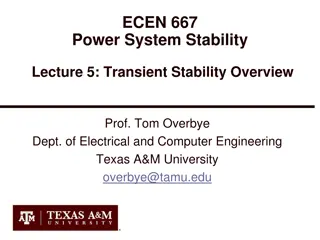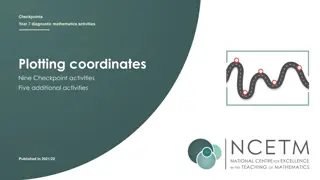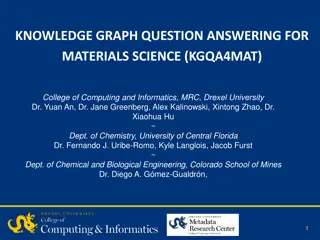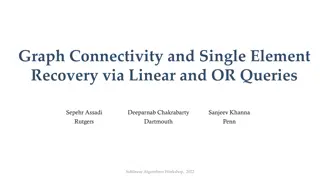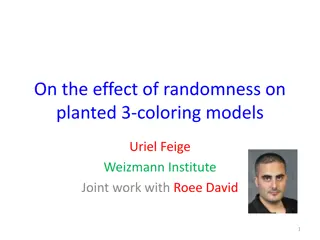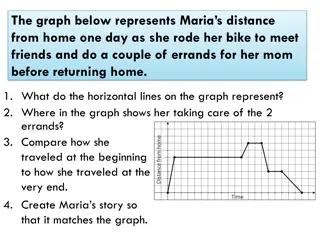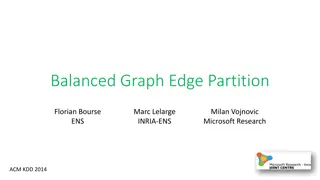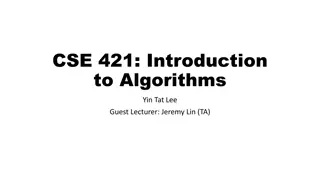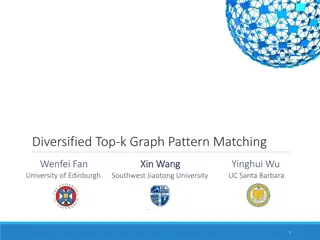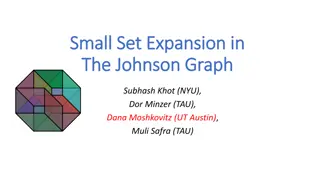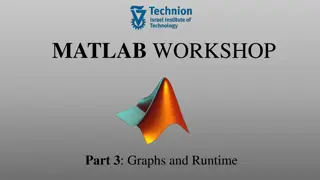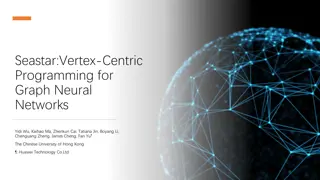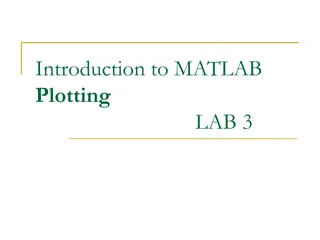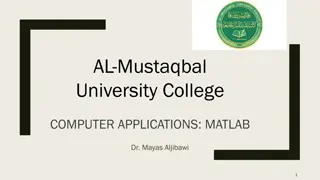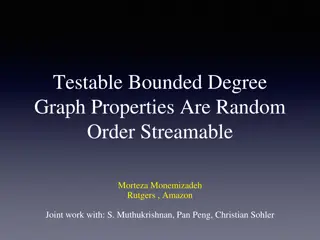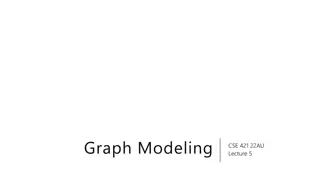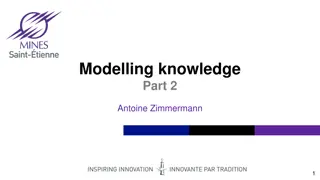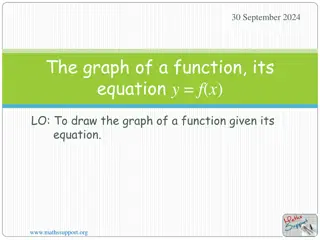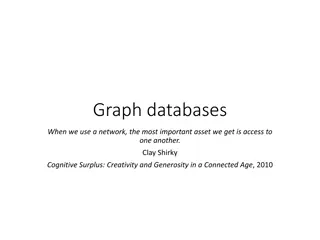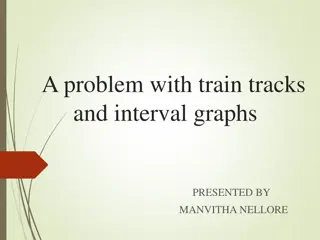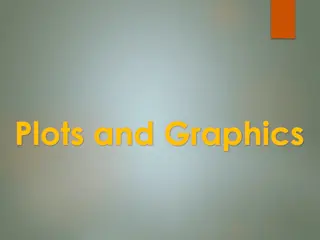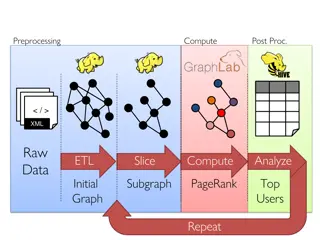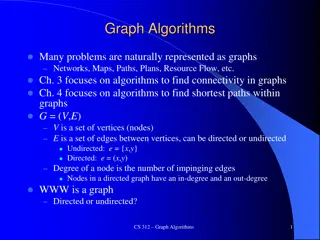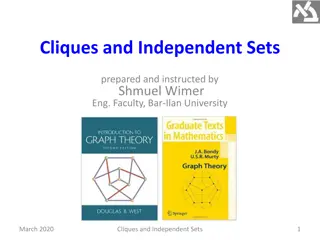Graph Machine Learning Overview: Traditional ML to Graph Neural Networks
Explore the evolution of Machine Learning in Graphs, from traditional ML tasks to advanced Graph Neural Networks (GNNs). Discover key concepts like feature engineering, tools like PyG, and types of ML tasks in graphs. Uncover insights into node-level, graph-level, and community-level predictions, an
5 views • 87 slides
Graphical representations of linear relationships
This material includes a series of checkpoint activities and additional tasks related to graphical representations of linear relationships for Year 8 students. Students will engage in tasks such as plotting points on coordinate grids, analyzing ant movements, exploring different rules for plotting p
1 views • 51 slides
Localised Adaptive Spatial-Temporal Graph Neural Network
This paper introduces the Localised Adaptive Spatial-Temporal Graph Neural Network model, focusing on the importance of spatial-temporal data modeling in graph structures. The challenges of balancing spatial and temporal dependencies for accurate inference are addressed, along with the use of distri
4 views • 19 slides
Graph Neural Networks
Graph Neural Networks (GNNs) are a versatile form of neural networks that encompass various network architectures like NNs, CNNs, and RNNs, as well as unsupervised learning models such as RBM and DBNs. They find applications in diverse fields such as object detection, machine translation, and drug d
2 views • 48 slides
Neo4j Graph Database Fundamentals
This comprehensive presentation delves into the fundamentals of Neo4j graph database, covering topics such as the definition of graph databases, reasons for their usage, insights into Neo4j and Cypher, practical applications like data flow analysis, and hands-on instructions on creating and querying
1 views • 20 slides
Graph-Based Data Science: Opportunities, Challenges, and Techniques
Graph-based data science offers a powerful approach to analyzing data by leveraging graph structures. This involves using graph representation, analysis algorithms, ML/AI techniques, kernels, embeddings, and neural networks. Real-world examples show the utility of data graphs in various domains like
3 views • 37 slides
Introduction to Graph Theory Matchings
Graph Theory Matchings have a rich history dating back to the 9th century AD. Distinct Representatives and Hall's Theorem play important roles in determining matchings in graphs. Understanding concepts like bipartite graphs, maximum matchings, and Hall's Marriage Theorem is essential in graph theory
1 views • 12 slides
Evolution of Freebase and the Google Knowledge Graph
Freebase was initially created in 2005 as an open shared database of knowledge, later acquired by Google and absorbed into the Google Knowledge Graph. Its approach included crowdsourcing updates and additions, focusing on data rather than text. The schema of Freebase included around 1500 types, 3500
2 views • 12 slides
Combining Graph Algorithms with Data Structures and Algorithms in CSE 373 by Kasey Champion
In this lecture, Kasey Champion covers a wide range of topics including graph algorithms, data structures, coding projects, and important midterm topics for CSE 373. The lecture emphasizes understanding ADTs, data structures, asymptotic analysis, sorting algorithms, memory management, P vs. NP, heap
2 views • 38 slides
Interactive Plotting with ggplot and Shiny: Enhancing Galaxy Visualization Tools
Explore the concept of transforming existing ggplot2 Galaxy tools into interactive platforms using Shiny or Plotly implementations. Discover a variety of plot types available with ggplot2, such as barplots, violin plots, PCA plots, and heatmaps. Utilize additional plot options through various geom_*
3 views • 9 slides
Deep Graph Theory: Philosophical Implications and Misconceptions
Delve into the realm of Deep Graph Theory where graph theory statements are analyzed beyond their conventional scope to uncover philosophical insights and correct misunderstandings. Discover the essence of trees, forests, and the unique relationship where every tree is regarded as a forest. Addition
1 views • 13 slides
Evolution and Demise of Freebase and the Google Knowledge Graph
Freebase was launched in 2005 as an open database of knowledge, initially populated with Wikipedia data and later incorporating crowdsourced updates. Acquired by Google in 2010, it was transitioned into Google's Knowledge Graph before being decommissioned in 2016. The schema contained around 1500 ty
4 views • 12 slides
Graph Theory Fundamentals
Delve into the basics of graph theory with topics like graph embeddings, graph plotting, Kuratowski's theorem, planar graphs, Euler characteristic, trees, and more. Explore the principles behind graphs, their properties, and key theorems that define their structure and connectivity.
0 views • 17 slides
Power System Transient Stability Overview: ECEN 667 Lecture Summary
This summary covers the key points discussed in the lecture on transient stability in power systems by Professor Tom Overbye at Texas A&M University. Topics include contingency analysis, results interpretation, PowerWorld Simulator usage, plotting results, and more. Detailed information is provided
0 views • 43 slides
Interactive Mathematics Activities for Year 7: Plotting Coordinates and More
Engage in a series of nine checkpoint activities focusing on plotting coordinates, including scenarios like ant movements, pirate treasure hunts, high and low points, and understanding coordinate axes. Dive into fun challenges and develop key skills in mathematics while exploring various coordinate
0 views • 29 slides
Association Rules with Graph Patterns: Exploring Relationships in Data
Dive into the world of association rules with graph patterns, where relationships and connections are analyzed through nodes and edges. Discover how to define association rules, identify customers, and uncover interesting patterns using graph-based techniques. Explore traditional and graph-pattern a
3 views • 18 slides
Advancements in Knowledge Graph Question Answering for Materials Science
Investigating natural language interfaces for querying structured MOF data stored in a knowledge graph, this project focuses on developing strategies using NLP to translate NL questions to KG queries. The MOF-KG integrates datasets, enabling query, computation, and reasoning for deriving new knowled
1 views • 13 slides
Solving the Professors to Coffee Lounge Problem: A Graph Theory Approach
An intriguing mathematical problem is presented where new faculty members at TIMS must be assigned to coffee lounge alcoves in a way that ensures no two new members meet after the first day. By constructing a graph based on meet-up timings, analyzing clashes, and determining intervals, this scenario
2 views • 19 slides
Graph Connectivity and Single Element Recovery via Linear and OR Queries
The content discusses the concepts of graph connectivity and single element recovery using linear and OR queries. It delves into the strategies, algorithms, and tradeoffs involved in determining unknown vectors, edges incident to vertices, and spanning forests in graphs. The talk contrasts determini
0 views • 28 slides
Impact of Randomness on Planted 3-Coloring Models
In this study by Uriel Feige and Roee David from the Weizmann Institute, the effect of randomness on planted 3-coloring models is investigated. The research delves into the NP-hard nature of 3-coloring problems, introducing a hosted coloring framework that involves choices like the host graph and th
1 views • 55 slides
Managing Large Graphs on Multi-Cores with Graph Awareness
This research discusses the challenges in managing large graphs on multi-core systems and introduces Grace, an in-memory graph management and processing system with optimizations for graph-specific and multi-core-specific operations. The system keeps the entire graph in memory in smaller parts and p
0 views • 14 slides
Maria's Bike Journey Graph Analysis
Maria's bike journey graph depicts her distance from home as she rode to meet friends and run errands before returning home. The graph shows her stops for errands, changes in direction, and her path back home. By interpreting the key features of the graph, such as intercepts and intervals, we can an
0 views • 15 slides
Balanced Graph Edge Partition and Its Practical Applications
Balanced graph edge partitioning is a crucial problem in graph computation, machine learning, and graph databases. It involves partitioning a graph's vertices or edges into balanced components while minimizing cut costs. This process is essential for various real-world applications such as iterative
1 views • 17 slides
Spanning Trees and Minimum Spanning Trees
Explore the concept of spanning trees and minimum spanning trees in graph theory through an in-depth lecture outline covering topics like Cut Property, Cycle Property, Kruskal's Algorithm, and more. Delve into the significance of Minimum Spanning Trees (MSTs) as the lowest-cost spanning tree of a gr
1 views • 41 slides
Graph Pattern Matching Challenges and Solutions
Graph pattern matching in social networks presents challenges such as costly queries, excessive results, and query focus issues. The complexity of top-k and diversified pattern matching problems requires heuristic algorithms for efficient solutions. Finding best candidates for project roles involves
0 views • 19 slides
Small Set Expansion in Johnson Graphs
In this detailed piece, Subhash Khot, Dor Minzer, Dana Moshkovitz, and Muli Safra explore the fascinating concept of Small Set Expansion in Johnson Graphs. The Johnson Graph is defined as a representation where nodes are sets of size K in a universe of size N, and two sets are connected if they inte
1 views • 14 slides
MATLAB Workshop: Graphs, Runtime Analysis, and Plotting Techniques
MATLAB Workshop Part 3 delves into the creation of 2D and 3D plots, along with advanced plotting commands, runtime analysis using tic and toc functions, and the utilization of the MATLAB profiler. The content demonstrates techniques for plotting multiple curves, creating subplots, and visualizing da
0 views • 22 slides
Vertex-Centric Programming for Graph Neural Networks
Seastar presents a vertex-centric programming approach for Graph Neural Networks, showcasing better performance in graph analytic tasks compared to traditional methods. The research introduces the SEAStar computation pattern and discusses GNN programming abstractions, execution, and limitations. Dee
0 views • 17 slides
MATLAB Plotting: Introduction and Examples
This content provides a hands-on guide to plotting functions in MATLAB, including creating arrays, plotting basic trigonometric functions like sin(x), manipulating arrays, and displaying plot properties. It covers essential plotting techniques, functions, display facilities, customization options, a
0 views • 17 slides
MATLAB Data Plotting Techniques for Multiple Functions
Explore advanced MATLAB techniques for plotting multiple functions in a single plot and across multiple subplots. Learn how to create visually appealing plots using functions like plot, subplot, title, and legend. Enhance your data visualization skills through hands-on examples and practical applica
0 views • 11 slides
Graph Property Testing and Algorithms Overview
Explore testable bounded degree graph properties, sparse graphs, d-bounded degree graphs, hyperfinite graphs, arboricity, maximum matching algorithms, and sublinear time approximation algorithms in graph data streams. Learn about various graph models and properties with examples, showcasing the impo
1 views • 53 slides
Graph Modeling and DFS Applications
Explore the world of graph modeling and DFS applications through lectures on graph vocabulary, edge classification in directed graphs, and the use of DFS to find cycles. Discover the significance of tree edges, back edges, forward edges, and cross edges in graph traversal. Learn how DFS can be utili
1 views • 32 slides
Graph-Based Knowledge Representation in Modelling: A Comprehensive Overview
This content delves into graph-based knowledge representation in modelling, detailing concepts such as recipe-ingredient relationships, formalisms for generalizing graph representation, and conceptual graphs by John F. Sowa. It explores how different interpretations describe the association between
2 views • 19 slides
Graphs of Functions in Mathematics
Learn how to draw the graph of a function using its equation. Explore examples such as plotting the graph of f(x) = 2x + 1 and f(x) = x^2 + 1 within specific ranges. Understand the process of creating tables of values, plotting points accurately, and connecting them with straight lines or smooth cur
0 views • 20 slides
Graph Databases and Neo4j
Graph databases offer a flexible way to manage data by representing relationships between nodes. Neo4j is a popular graph database system that uses Cypher for querying. This guide provides insights into graph database concepts, advantages, and getting started with Neo4j, including creating nodes and
1 views • 39 slides
Solving Train Track Problems Using Interval Graphs and Graph Coloring
Presented by Manvitha Nellore, this content addresses real-world train track problems in busy cities by proposing solutions through interval graphs and graph theory. The approach involves allotting tracks to trains by scheduling with time intervals to avoid conflicts. An interval graph is defined, a
0 views • 15 slides
Understand plotting functions in MATLAB
Explore how to plot functions like sin(x) and e^(-x/3)sin(x) in MATLAB, along with multiplying arrays and utilizing display facilities such as plot, stem, and setting titles and labels. Learn about the nomenclature for typical XY plots and see an example of plotting rocket height vs. downrange dista
0 views • 57 slides
Data Processing and Analysis for Graph-Based Algorithms
This content delves into the preprocessing, computing, post-processing, and analysis of raw XML data for graph-based algorithms. It covers topics such as data ETL, graph analytics, PageRank computation, and identifying top users. Various tools and frameworks like GraphX, Spark, Giraph, and GraphLab
0 views • 8 slides
Graph Algorithms for Connectivity and Shortest Paths
Graph algorithms play a crucial role in solving problems represented as networks, maps, paths, plans, and resource flow. This content delves into ways to find connectivity in graphs and algorithms for determining shortest paths. It discusses graph representations using adjacency matrices and lists,
1 views • 32 slides
Insights into Cliques and Independent Sets in Graph Theory
Exploring the concepts of cliques, independent sets, and theorems in graph theory regarding enemy relationships, maximum number of edges in 3-free graphs, and properties of multipartite graphs. The propositions and theorems discussed shed light on graph structures and their properties, providing val
0 views • 32 slides
